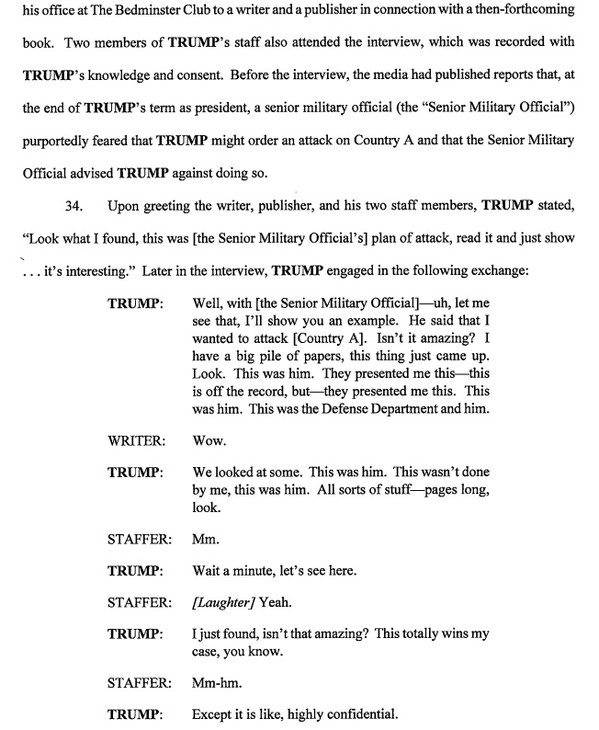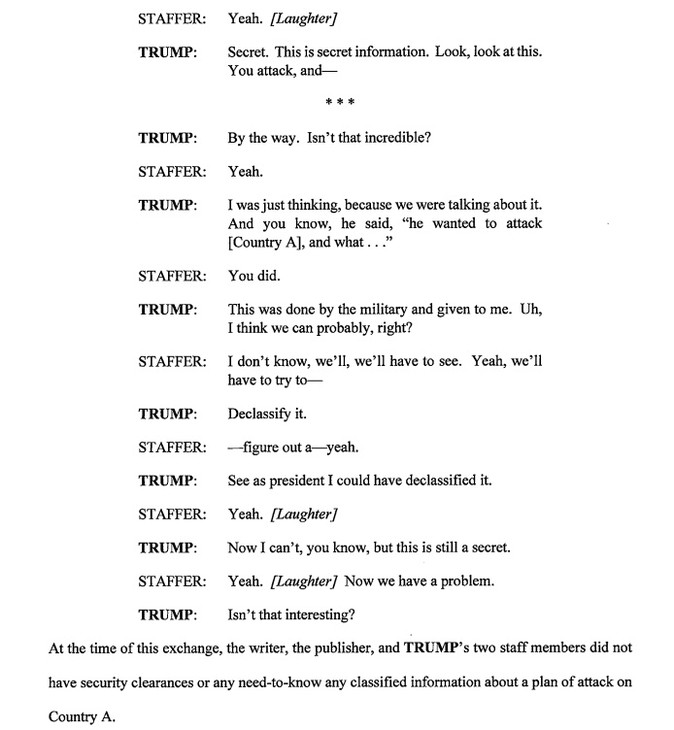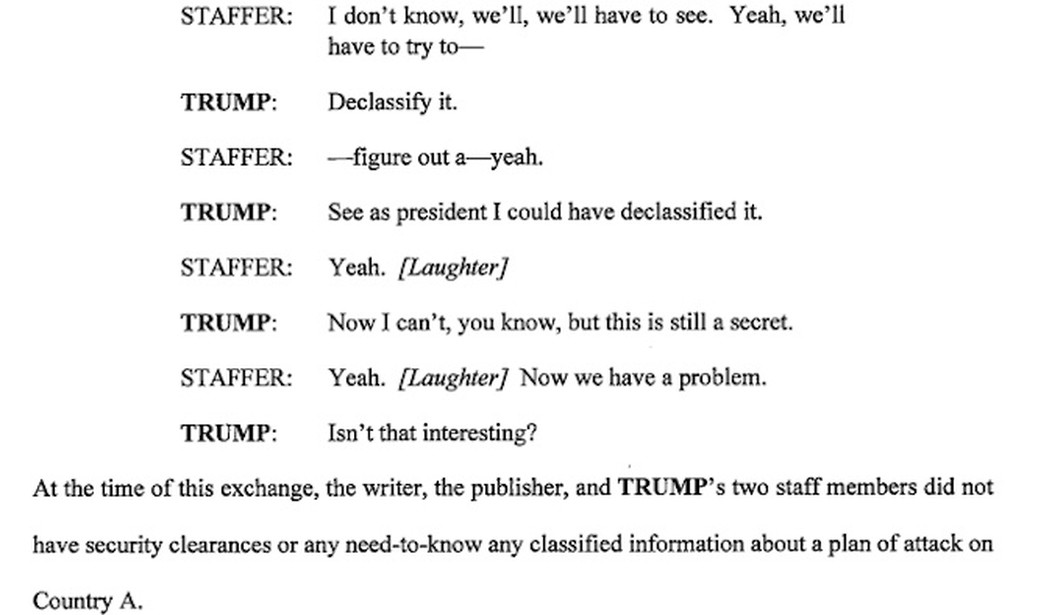Just how serious is the bill of charges that Donald Trump will face on Tuesday? “These are hits below the water line,” Jonathan Turley tells Fox News this afternoon after the surprise unsealing of the 38-charge indictment against Trump. “This is not an indictment that you can dismiss.”
You can bet that Trump’s legal team will literally attempt that on Tuesday, but Turley cautions that special counsel Jack Smith put a lot of effort in making sure it will stand. And not just in court, either:
Turley later: "It's really breathtaking. Obviously, this is mishandling, you know, putting classified documents into ballrooms and bathrooms is — it borders on the bizarre. … the visual and audio tape evidence is really daunting" pic.twitter.com/7ElFhW5H7l
— Lis Power (@LisPower1) June 9, 2023
So did locating an e-mail server in a Chappaqua bathroom. But I’m getting ahead of myself …
You can find the indictment here, although not in a form that can be easily copied and pasted. As Turley says, Smith and his team packed a significant amount of detail in the allegations. The biggest problem that presents itself in the allegations is Trump’s own statements.
As CNN reported this morning and I included in my earlier post, Trump exposed classified data to uncleared individuals while commenting on the fact that the material involved was still classified. In this exchange on pages 15-16 of the indictment, Trump is showing a war plan for an attack on an unnamed country (reportedly Iran) to a publisher, a writer, and a Trump staffer — none of whom were cleared for that kind of material whether classified or not. And Trump comments at the time that he never got around to declassifying it anyway:


On top of that, it’s difficult to believe that this material should have been declassified. We don’t declassify our war plans against other countries, and we shouldn’t even discuss the fact that they exist outside of need-to-know military and command circles. Even if it was officially declassified — which Trump denies doing in this exchange — those documents would obviously be incredibly sensitive and exposing them in this manner might still be indictable. Despite common assumptions, 18 USC 793 does not require that material be classified to indict someone for mishandling it. The word “classified” doesn’t appear in the statute at all.
The indictment charges Trump under 18 USC 793(e), which only qualifies the material as being potentially injurious to the US or advantageous to a foreign power:
(e) Whoever having unauthorized possession of, access to, or control over any document, writing, code book, signal book, sketch, photograph, photographic negative, blueprint, plan, map, model, instrument, appliance, or note relating to the national defense, or information relating to the national defense which information the possessor has reason to believe could be used to the injury of the United States or to the advantage of any foreign nation, willfully communicates, delivers, transmits or causes to be communicated, delivered, or transmitted, or attempts to communicate, deliver, transmit or cause to be communicated, delivered, or transmitted the same to any person not entitled to receive it, or willfully retains the same and fails to deliver it to the officer or employee of the United States entitled to receive it …
Generally speaking, the US designates such material by classifying it, but note well that the statute doesn’t rely on classification. If a prosecutor can prove that the material retained or exposed would either injure US security or provide a material benefit to any foreign power, but especially a hostile power, they can convict without even discussing classification or declassification. Exposing America’s war plan for a particular country to people outside of need-to-know personnel clearly counts as information “to the advantage of a foreign nation.”
Furthermore, showing them off to score political points in this manner is, even apart from questions of criminality, incredibly poor judgment. If Smith can back this charge up in court with the tape and witness testimony, then Trump’s indiscretion is likely to get him convicted.
That also applies to paragraph 35, again whether Trump declassified the material or not:
"Hey, you're a political operative and what I'm about to do is illegal. So don't stand so close to me, but lookee here." pic.twitter.com/ziXgWxBxlI
— Michael Weiss (@michaeldweiss) June 9, 2023
The rest of the indictment relates to illegal retention of 30-plus classified documents, as well as the obstruction and conspiracy counts. Those seem somewhat underwhelming in comparison, but still have teeth. Turley has a point in his reality check for Trump’s defenders.
Smith broke his silence this afternoon on his rationale, which is where the argument runs aground, at least arguably:
BREAKING: Special counsel Jack Smith on the indictment of former Pres. Trump: "Our laws that protect national defense information are critical for the safety and security of the United States, and they must be enforced." https://t.co/wYMaRO327d pic.twitter.com/L0iPxR6IRU
— ABC News (@ABC) June 9, 2023
That sounds fine — if applied equally. The DoJ isn’t charging others who wound up with classified material in their possession, such as Mike Pence, but Smith could argue that’s because (a) Pence wasn’t knowingly exposing the material to others and (b) didn’t obstruct the investigation into it. A different special counsel is conducting an investigation into Joe Biden’s illegal retention of classified material at several different locations, so until we see a conclusion to that case, we can’t judge whether a different standard was applied.
But we can certainly conclude that the DoJ applied a different standard to Hillary Clinton. Again, refer back to my post this morning for my lengthy recollection of her case, but a brief recap: Clinton committed thousands of 18 USC 793 violations, stored and transmitted classified and sensitive material from an unauthorized and unsecured home server, did so with the intent to subvert Congress’ constitutional oversight authority over her office, serially misrepresented in court to not use e-mail, and then obstructed investigations by altering records, destroying devices, and more.
In that case, the DoJ under a Democrat administration refused to enforce “our laws that protect national defense information are critical for the safety and security of the United States” when a Democrat broke the law. In fact, the Obama administration didn’t even bother to refer it to a special counsel. Now, however, under parallel circumstances, they’re rushing to get a “speedy trial” to derail a potential political rival to the current Democrat president. It stinks to high heaven and makes a mockery of the DoJ’s purported stance with Hillary in 2016, which was that this kind of indictment required an intent to damage the US.
Still, that is a political consideration, not necessarily a legal impediment for Smith. Selective prosecution complaints only go so far, especially before a trial. If this goes to trial, Trump might need to consider what he’ll do on appeal after conviction.








Join the conversation as a VIP Member